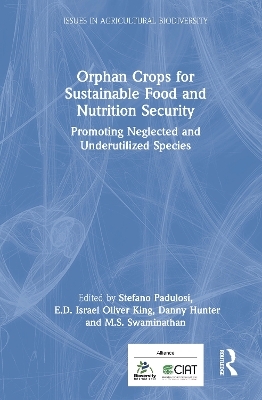
Orphan Crops for Sustainable Food and Nutrition Security
Routledge (Verlag)
978-0-367-49158-1 (ISBN)
Orphan Crops for Sustainable Food and Nutrition Security discusses the issues, challenges, needs and opportunities related to the promotion of orphan crops, known also as neglected and underutilized species (NUS).
The book is structured into six parts, covering the following themes: introduction to NUS, approaches, methods and tools for the use enhancement of NUS, integrated conservation and use of minor millets, nutritional and food security roles of minor millets, stakeholders and global champions, and, building an enabling environment. Presenting a number of case studies at the regional and country levels, the chapters cover different but highly interlinked aspects along the value chains, from acquisition and characterization of genetic diversity, cultivation and harvesting to value addition, marketing, consumption and policy for mainstreaming. Cross-cutting issues like gender, capacity building and empowerment of vulnerable groups are also addressed by authors. Representatives from communities, research for development agencies and the private sector also share their reflections on the needs for the use enhancement of NUS from their own perspectives.
This book will be of great interest to students and scholars of food security, sustainable agriculture, nutrition and health and development, as well as practitioners and policymakers involved in building more resilient food and production systems.
Stefano Padulosi is a Senior Scientist at the Alliance of Bioversity International and CIAT, Via di San Dominico, 1, 00153, Rome, Italy. E.D. Israel Oliver King is Principal Scientist at the M.S. Swaminathan Research Foundation, Chennai, India. Danny Hunter is a Senior Scientist at the Alliance of Bioversity International and CIAT, Via di San Dominico, 1, 00153, Rome, Italy. M.S. Swaminathan is the Founder of the M.S. Swaminathan Research Foundation, Chennai, India.
PART I – INTRODUCTION TO NUS 1. NUS: What they are and why the world needs them 2. Landmark of NUS events and key publications 3. Mainstreaming NUS for nutrition sensitive agriculture: a holistic approach 4. NUS and Peoples sense of dietary diversity and well-being 5.Diversity and small millets in India 6.From discovery to food system diversification with African Neglected and Underutilized species 7. Barriers to adopting a diversity of NUS fruit trees in Latin American food systems 8. Promoting Buckwheat in China 9.Neglected and underutilized species for sustainable food and nutrition security and role of conservation in Mexico 10. Neglected and underutilized species in Brazil: from obscurity to the non-conventional edible plants 11. Underutilized genetic resources and crop diversification in Europe 12. Neglected and underutilized species and Indigenous foodways of Oceania PART II – APPROACHES, METHODS AND TOOLS FOR THE USE ENHANCEMENT OF NUS 13. The BFN mainstreaming toolkit. A roadmap to using neglected and underutilized species for food system change 14. Development of seasonal calendars for sustainable diets- experiences from Guatemala, Mali and India 15. Enhancing the use of underutilized food crops: partnerships in a success story of pop cereal business in Kenya 16. Agritourism and conservation of neglected and underutilized native Andean crops in Santiago de Okola, Bolivia 17. Mainstreaming African vegetables to improve diets and livelihoods 18. Slow Food and NUS: Protecting and promoting endangered food products PART III – INTEGRATED CONSERVATION AND USE OF MINOR MILLETS 19. Conservation and utilization of small millets genetic resources: Global and Indian perspectives 20.Challenges to Conserving Millets in Ecologically Sensitive Areas 21. Community-centred value chain development of nutri-millets: challenges and best practices in India 22 Taking Millets to Millions: Experiences from Government-Driven value chains. 23. Millet based intercropping systems facilitated by beneficial microbes for climate resilient sustainable farming in tropics 24. Status of minor millets processing technologies in India: an overview PART IV –NUTRITIONAL AND FOOD SECURITY ROLES OF MINOR MILLETS 25. Modelling the food security role of millets under climate change in eastern Madhya Pradesh 26. Germplasm characterization and novel technologies to unleash the nutritional potentials of small millets 27. Millets in Farming Systems in support of Nutrition and Social Safety Net Programmes 28. The Smart Food Approach: The importance of the triple bottom line and diversifying staples PART V – STAKEHOLDERS AND GLOBAL CHAMPIONS 29. NUS and Local Communities 30. NUS and Private Sector 31. Perspectives from R4D and International Agencies supporting NUS PART VI – BUILDING AN ENABLING ENVIRONMENT 32. Equity, Gender and Millets: Implications for Policy 33. What is going on around the world: major NUS players and ongoing efforts 34. In a well-nourished world, underutilized crops will be on the table
| Erscheinungsdatum | 24.09.2021 |
|---|---|
| Reihe/Serie | Issues in Agricultural Biodiversity |
| Zusatzinfo | 25 Tables, black and white; 12 Line drawings, black and white; 74 Halftones, black and white; 86 Illustrations, black and white |
| Verlagsort | London |
| Sprache | englisch |
| Maße | 156 x 234 mm |
| Gewicht | 1030 g |
| Themenwelt | Naturwissenschaften ► Biologie ► Ökologie / Naturschutz |
| Sozialwissenschaften ► Soziologie ► Spezielle Soziologien | |
| Weitere Fachgebiete ► Land- / Forstwirtschaft / Fischerei | |
| ISBN-10 | 0-367-49158-3 / 0367491583 |
| ISBN-13 | 978-0-367-49158-1 / 9780367491581 |
| Zustand | Neuware |
| Informationen gemäß Produktsicherheitsverordnung (GPSR) | |
| Haben Sie eine Frage zum Produkt? |
aus dem Bereich


